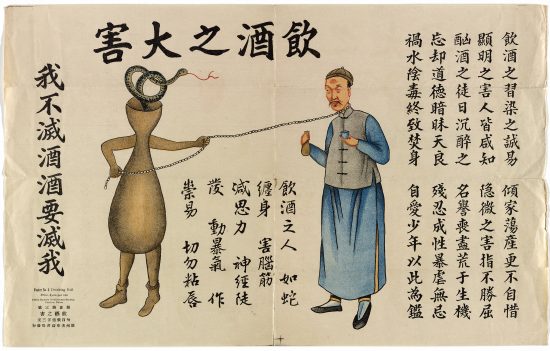A Container of Alcohol has a Chain around a Man’s Neck
English Translation
Title:
The Great Harm of Drinking Alcohol
Left side:
I do not destroy alcohol, alcohol will destroy me
Right side:
The bad habit of drinking alcohol is really easy to fall into
Consuming one’s household and sweeping away one’s property is even more ignorant
A clear harm is known by everyone
Small harms concealed are innumerable
The disciple of excessive drinking daily sinks deeper into it
To completely lose one’s honorable reputation is to neglect one’s life
Forget one’s virtue and obscure one’s conscience
Cruelty becomes one’s second nature, tyrannical and fearless
A sinister source of calamity that in the end results in burning oneself
A young person who loves him (or her)self will take this as an object lesson
Middle:
The person who drinks alcohol
Like a snake it will entwine your body
Harm your brain
Sap your strength
[Cause you to] suddenly go crazy
[Cause you to] frequently become enraged
[Cause you to] easily make mischief
By no means [should it—alcohol] be involved with your lips
Bottom left:
Picture #3
The harm of drinking alcohol
3 Yuan for every 100
China Baptist Publication Society, Canton China
[In English]
Poster No. 3 Drinking Evil
Price, $3,00 per 100
China Baptist Publication Society, Canton, China
Simplified Transcription
顶端:饮酒之大害
左侧:
我不灭酒酒要灭我
右侧:
饮酒之习染之诚易
倾家荡产更不自惜
显明之害人皆咸知
隐微之害指不胜屈
酗酒之徒日沉醉之
名誉丧尽荒于生机
忘却道德暗昧天良
残忍成性暴虐无忌
祸水阴毒终致焚身
自爱少年以此为鉴
中间:
饮酒之人
如蛇缠身
害脑筋
减思力
神经陡发
动暴气
作祟易
切勿粘唇
左下:
图画第三号
饮酒之害
每百张价洋三元
广州美华印书局发行


Several notes on the translation:
Right side, line 2: from idiom 成语: 懒不自惜.
Middle, second to last line: The second character as it is drawn in the poster, as far as I can tell, is either misdrawn or a variant; one online character variant website from Taiwan mentions that 祟 is easily confused with 崇, and it seems that the poster’s artist combined the two with a 出 over a 宗, when it should be a 出 over a 示, for 祟, or a 山 over a 宗 for 崇; see (https://dict.variants.moe.edu.tw/variants/rbt/word_attribute.rbt?quote_code=QTAyODg4). So the character should either be 祟 suì, as I have translated it, or 崇 chóng, but 崇 does not make any sense, whereas 作祟 is a phrase, figuratively meaning ‘to cause trouble’ or ‘make mischief’.
Middle, last line: from 粘连, read figuratively.